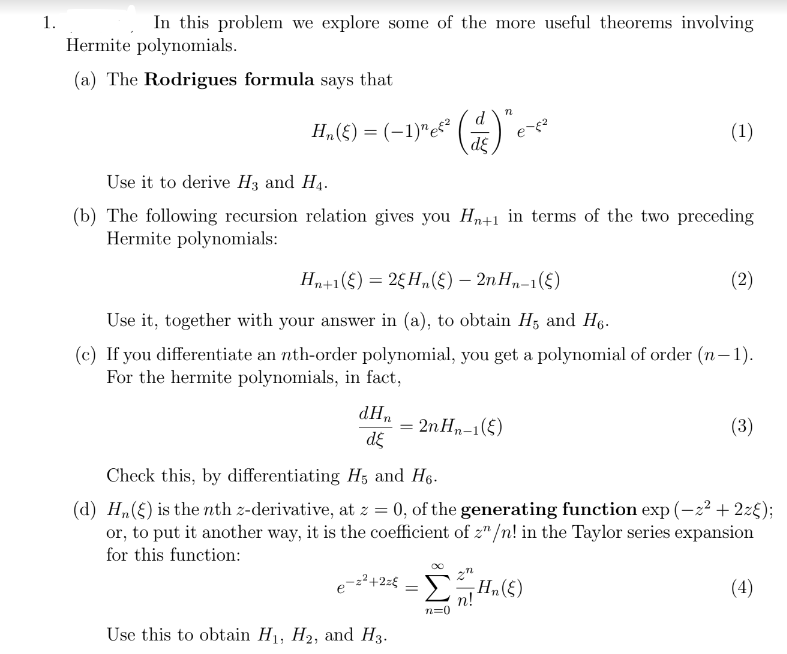(a) The Rodrigues formula says that H₂ (§) = (-1)"¹ es ² * (₁) * (1) Use it to derive H3 and H₁. (b) The following recursion relation gives you Hn+1 in terms of the two preceding Hermite polynomials: Hn+1(E) = 2H₂(E) — 2nH₂-1(E) Use it, together with your answer in (a), to obtain H5 and H6. (2)
(a) The Rodrigues formula says that H₂ (§) = (-1)"¹ es ² * (₁) * (1) Use it to derive H3 and H₁. (b) The following recursion relation gives you Hn+1 in terms of the two preceding Hermite polynomials: Hn+1(E) = 2H₂(E) — 2nH₂-1(E) Use it, together with your answer in (a), to obtain H5 and H6. (2)
Algebra & Trigonometry with Analytic Geometry
13th Edition
ISBN:9781133382119
Author:Swokowski
Publisher:Swokowski
Chapter4: Polynomial And Rational Functions
Section4.3: Zeros Of Polynomials
Problem 66E
Related questions
Question

Transcribed Image Text:1.
In this problem we explore some of the more useful theorems involving
Hermite polynomials.
(a) The Rodrigues formula says that
H₂(E)= (-1)¹ ²
()*
dHn
de
Use it to derive H3 and H₁.
(b) The following recursion relation gives you H₂+1 in terms of the two preceding
Hermite polynomials:
e-8²
H₂+1(E) = 2 H₂(E) — 2nHn-1(E)
Use it, together with your answer in (a), to obtain H5 and H₁.
(c) If you differentiate an nth-order polynomial, you get a polynomial of order (n-1).
For the hermite polynomials, in fact,
= 2n Hn-1(E)
Use this to obtain H₁, H₂, and H3.
(1)
e==t2 = Ση#n(s)
e-z²+2=
Hn
n!
n=0)
(2)
Check this, by differentiating H5 and H6.
(d) H() is the nth z-derivative, at z = = 0, of the generating function exp(-z² + 2z);
or, to put it another way, it is the coefficient of z" /n! in the Taylor series expansion
for this function:
(3)
(4)
Expert Solution
This question has been solved!
Explore an expertly crafted, step-by-step solution for a thorough understanding of key concepts.
Step by step
Solved in 3 steps with 3 images

Recommended textbooks for you

Algebra & Trigonometry with Analytic Geometry
Algebra
ISBN:
9781133382119
Author:
Swokowski
Publisher:
Cengage

Elements Of Modern Algebra
Algebra
ISBN:
9781285463230
Author:
Gilbert, Linda, Jimmie
Publisher:
Cengage Learning,

Linear Algebra: A Modern Introduction
Algebra
ISBN:
9781285463247
Author:
David Poole
Publisher:
Cengage Learning

Algebra & Trigonometry with Analytic Geometry
Algebra
ISBN:
9781133382119
Author:
Swokowski
Publisher:
Cengage

Elements Of Modern Algebra
Algebra
ISBN:
9781285463230
Author:
Gilbert, Linda, Jimmie
Publisher:
Cengage Learning,

Linear Algebra: A Modern Introduction
Algebra
ISBN:
9781285463247
Author:
David Poole
Publisher:
Cengage Learning

College Algebra
Algebra
ISBN:
9781305115545
Author:
James Stewart, Lothar Redlin, Saleem Watson
Publisher:
Cengage Learning